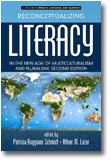
Reconceptualizing Literacy in the New Age of Multiculturalism and Pluralism
2nd Edition
Edited by:
Patricia Ruggiano Schmidt, Le Moyne College
Althier Lazar, St. Joseph's University
A volume in the series: Literacy, Language and Learning. Editor(s): Claudia Finkbeiner, Universitaet Kassel. Wen Ma, Le Moyne College.
Published 2015
The 2nd Edition of Reconceptualizing Literacy in the New Age of Multiculturalism and Pluralism honors the genius of Dr. Peter Mosenthal. His contributions to the field of literacy were unprecedented. Many described him as a superb researcher who never lost sight of the purpose of education. He made us laugh as he led us in a nursery rhyme song during his National Reading Conference (LRA) Presidential Address and made us think as he explained the significance of educational implications in all research articles. He also mentored and taught graduate students in gentle and carefully attentive ways, showing his respect and appreciation for the work of each individual in the field. He was a remarkable person.
The second edition of this book includes many experienced and new scholars from around the world. Qualitative and quantitative research methodologies are scattered throughout and the practical and theoretical are well represented. New Literacies and Global Perspectives are added sections in this volume. In this era of the “Common Core”, Reconceptualizing Literacy in the New Age of Multiculturalism and Pluralism, presents a rational educational balance for literacy development across the curriculum.
CONTENTS
Foreword, Lee Gunderson. Preface. Thank You. SECTION I: THEORETICAL FRAME. Frameworks for Promoting Multicultural Literacies: Moving Toward Educational Justice, Georgia Earnest García and Arlette Ingram Willis. Multicultural Beliefs and Practices of Early Childhood Practitioners: A Qualitative Analysis of Scope and Complexity, Jyotsna Pattnaik. SECTION II: NEW LITERACIES. Monocultural Literacy: The Power of Print, Pedagogy, and Epsitemological Blindness, Dawnene D. Hassett and Carl A. Grant. The Possibilities of Social Equity Literacy Teaching in an Era of Accountability: What the Narratives of Two Urban Teachers Reveal, Althier M. Lazar, Danielle Nicolino and Tracie Sanlin. Mapping Critical Media Literacy onto Iterative Remix Practice, Kedrick James. SECTION III: POWER ISSUES. The Nexus of Critical and Digital Literacies: “I Have a Voice and I’m Gonna Use It”, Rachel Brown. Low‐SES ELLs’ New Literacies Outside School: Attitudes, Access, and Agency, Guofang Li. Literacy Capital in Two Immigrant Families: Longitudinal Case Studies, Catherine Compton‐Lilly and Rohany Nayan. SECTION IV: LITERACY AND CULTURE. Cultural Issues Related to Teaching Reading, Jon Reyhner and Ward Cockrum. Best Practice(s)? The Cultural Discourse of Developmentalism in American Early Education: A Cross‐Cultural Comparison, Diane M. Hoffman and Chenyu Wang. Culturally Compelling Genre Teaching: Inviting All Learners to Understand and Use Genre Knowledge, Kathleen A. Hinchman and Fenice B. Boyd. Risk the Leap: Connect and Communicate With Immigrant Families for the Education of Their Children, Patricia Ruggiano Schmidt. SECTION V: CONNECTING WITH MINORITY PERSPECTIVES. How the Children of Cross‐National Marriage Families Become Bilingual: An Ecological Systems Perspective, Yu‐Ching Yeh and Hsiang‐Ju Ho. Cultural Literacy Practices in U.S. Public Schools: Voices of Pakistani Immigrant Parents, Fawzia Reza and Jyotsna Pattnaik. Literacy Engagement in Refugee Families: Connecting Practices Across Contexts, Sunita Singh. SECTION VI: TEACHER EDUCATION. From Minding the Gaps to Mending the Gaps: Lessons from Community‐Based Learning in Adolescent Literacy Methods Courses, Diane Zigo and Christopher Gorton. Beyond Pedagogy in Teacher Education: Developing Teacher Candidates’ Linguistic Knowledge of English and Students’ Native Languages, Shelley Hong Xu. Critical Conversations in Teacher Education: Using Video Analysis to Discuss the Identity Positions of Preservice Teachers, Amy Vetter, Melissa Schieble and Mark Meacham. “How Are We Going to Be Testing That?” Challenges to Implementing Culturally Responsive Literacy Instruction, Rebecca Powell, Susan Cantrell and Pamela Correll. Author Biographies.
-
Paperback978-1-68123-239-3
Web price: $62.04 (Reg. 72.99)
-
Hardcover978-1-68123-240-9
Web price: $89.24 (Reg. 104.99)
- eBook978-1-68123-241-6

- EDU000000 - EDUCATION: General
- EDU002000 - EDUCATION: Adult & Continuing Education
- EDU037000 - EDUCATION: Research
-
 Authentic Voices
Culturally Responsive Teaching and Learning
Authentic Voices
Culturally Responsive Teaching and Learning
-
 Chinese Education from the Perspectives of American Educators
Chinese Education from the Perspectives of American Educators
-
 Collaborative Learning in a Global World
Collaborative Learning in a Global World
-
 Educational Practices in China, Korea, and the United States
Reflections from a Study Abroad Experience
Educational Practices in China, Korea, and the United States
Reflections from a Study Abroad Experience
-
 Innovative Approaches to Teaching Multilingual Students
Innovative Approaches to Teaching Multilingual Students
-
 Listening to the Voices of Boys
Exploring the Motivation of Primary Boys to Engage in Reading
Listening to the Voices of Boys
Exploring the Motivation of Primary Boys to Engage in Reading
-
 Views from Inside
Languages, Cultures, and Schooling for K‐12 Educators
Views from Inside
Languages, Cultures, and Schooling for K‐12 Educators

